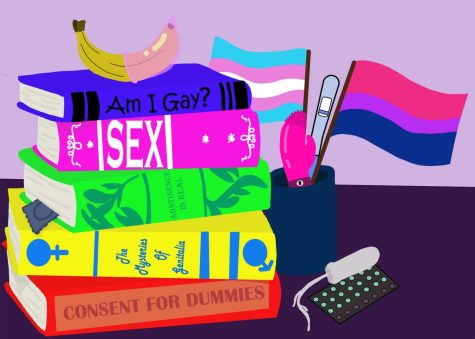Let’s talk about sex, baby: Columbia students weigh in on what their sex education lacked
February 7, 2022

Ah, sex education.
We all remember those days of being sat down and told about the birds and the bees … or, if you went to most schools in America, you were taught that abstinence — the choice to not have sex until marriage — is the way to go.
As Coach Carr from the movie “Mean Girls” said: “Don’t have sex. Cause you will get pregnant … and die. Don’t have sex in the missionary position. Don’t have sex standing up. Just don’t do it. Promise?”
For some students, this depiction of sex education, meant to be funny in the movie, was a reality in their schools.
Austin Dunham, a senior comedy writing and performance major, said his biggest issue with sex education was the amount of shame and fear his middle school and high school in Iowa instilled in its students.
“I remember for such a long time after I was in those classes, I was like, ‘I’m not having sex with anybody. I don’t want to get any STIs; I don’t want anything to do with that,’” Dunham said. “They made people so afraid, and I think that’s what I hate the most about it.”
According to World Population Review, in the United States, 37 states require that when sex education is taught, abstinence-only must be included, and 26 states require that it is emphasized.
Cary Archer, manager of education and outreach at Planned Parenthood of Illinois, refers to abstinence-only programs as “sexual risk avoidance programs.” Archer said there is more harm in abstinence-focused programs than benefits.
“When young people who have gone through abstinence-only education choose to start engaging in sex, they’re much less likely to use contraception or condoms or to access health care around sexually transmitted infections or things of that nature,” Archer said.
According to Planned Parenthood, each year in the U.S., half of the 20 million new cases of sexually transmitted infections are diagnosed in young people ages 15 to 24 years old, and approximately 750,000 teenagers become pregnant annually.
Another issue with sex education programs voiced by Columbia students is the exclusive emphasis on heteronormative, cisgendered intercourse.
Reese Marcus, a first-year acting major, said she and other LGBTQ+ classmates felt that their high school in Minnesota neglected to teach students about sexualities and genders outside of female and male heteronormative education.
“A lot of us, especially a lot of the LGBTQ+ students like myself, felt like it was very not inclusive,” Marcus said. “It was like, why does our experience with sex not matter as much as typical heterosexual intercourse?”
Marcus decided to take the matter into her own hands by writing a letter to her principal about the school’s heteronormative and abstinence-only sex education during her last year of high school.
According to classmates a grade level below Marcus, their letter did have an effect on the sex program regarding education about birth control and preventative methods, but it still fell short of better addressing issues of gender and sexuality.
According to Archer, abstinence-only programs create shame and stigma toward people who do not identify as heteronormative or cisgender.
“If you’re only going to say one type of sex is okay, specifically penile-vaginal sex, anyone who’s not going to have that type of sex is therefore automatically stigmatized,” Archer said.
Ada Greene, a sophomore film and television major, identifies as a straight, cisgender woman, but she disagrees with heteronormative sex education.
“Even though I fit into that category, a lot of what I learned was not helpful to me because of that sort of atmosphere,” Greene said. “I can’t imagine how much more unhelpful it would be if you’re like, ‘Okay, well, this isn’t going to apply to me because I’m gay,’ or ‘this isn’t gonna apply to me because I don’t see myself represented,’ so what’s the point?”
In Illinois, the Keeping Youth Safe and Healthy Act requires that sex education classes are “medically accurate, developmentally and age appropriate to include instruction that is also culturally appropriate, inclusive, and trauma informed.”
The new law — which went into effect in August 2021 — also confirms that comprehensive personal health, safety and sexual health education is affirming of identities including LGBTQIA+ and pregnant or parenting youth.
“If I had a sex ed class that was just like, ‘Here’s everything about everything,’ I would take it in a heartbeat,” Dunham said. “I’m in the LGBTQ [community], but there’s things about gender and sexuality that I don’t understand. You know, things change daily, but if I could have that resource, I would take that now.”
With the world adapting and evolving, Greene said sex education courses should be adapting as well to fit the needs of young adults who need proper guidance, support and education.
”I don’t really see any excuses for educators to dismiss an inclusive, diverse sex ed,” Greene said. “We have the resources; we have the people. The want is there; the need is there. I don’t see any reason not to do it.”







